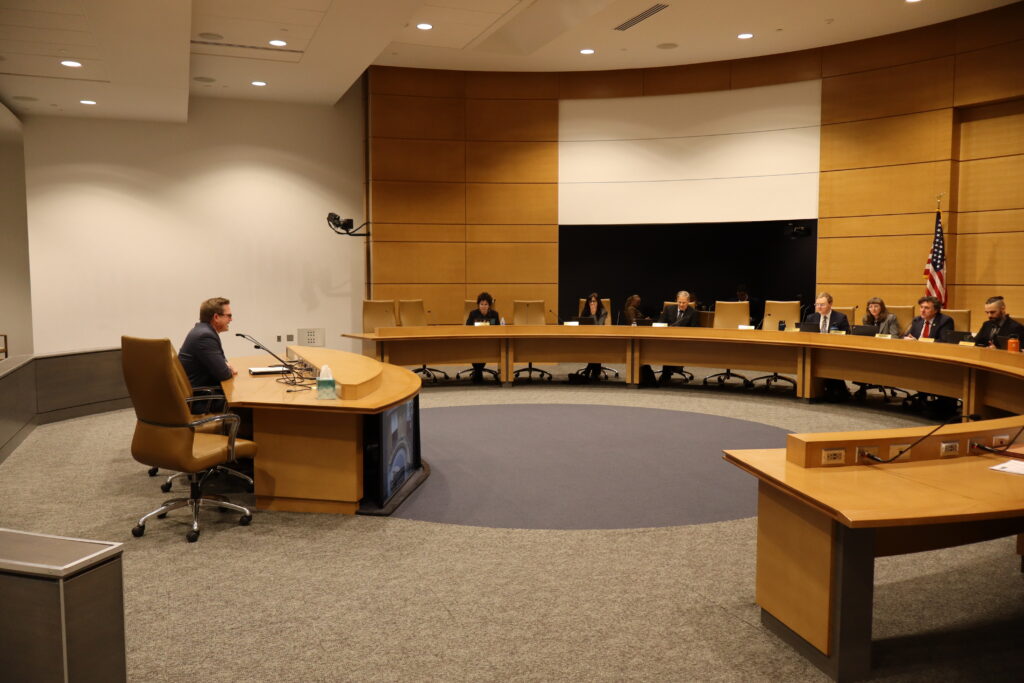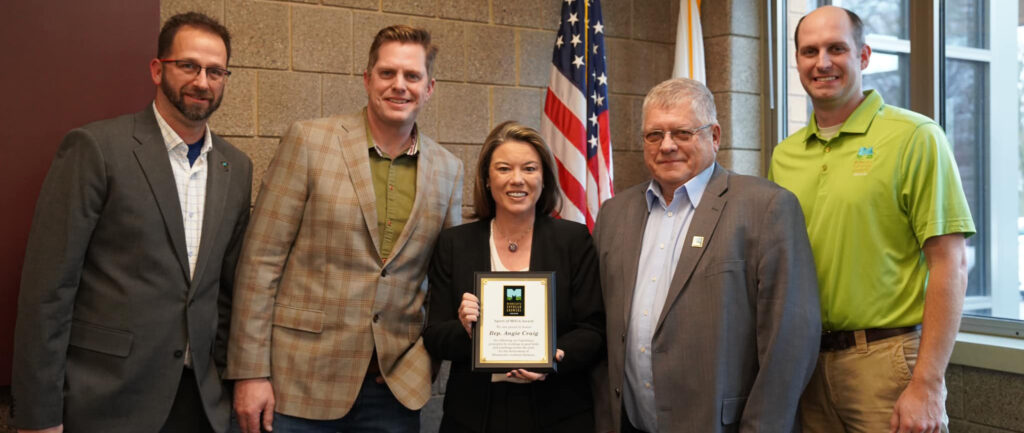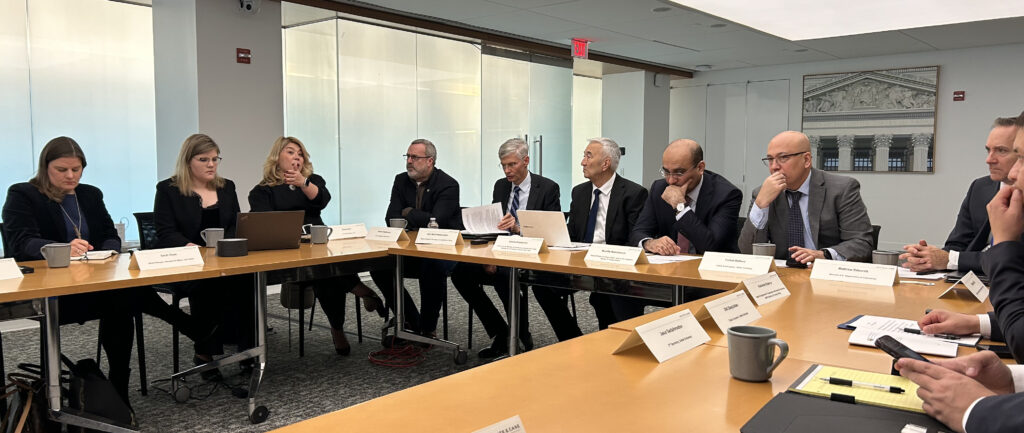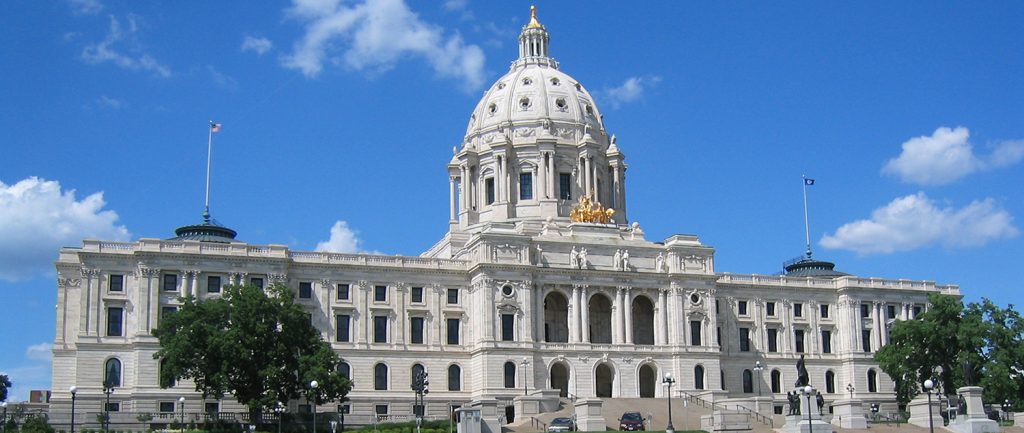Darin Johnson remembers the nerves he felt before his first one-on-one meeting with a legislator, back in 2019 during an office visit with the late Congressman Jim Hagedorn in Washington, D.C.
Those worries are a distant memory. Johnson, now president of the Minnesota Soybean Growers Association (MSGA), can work the halls of the state Capitol like the self-assured, seasoned advocacy pro he’s become.
“It was great to be at the Capitol with our team and do everything we can to share our message,” Johnson said. “We’re working every lever we can to stick up for our soybean farmers.”
Along with Johnson, a dozen grower leaders from across the state converged Feb. 18-19 in St. Paul to hold MSGA’s annual Hill Visit and deliver the organization’s 2025 policy priorities. Prior to the Hill Visits, MSGA and Minnesota Corn hosted more than 50 legislators as part of the Legislative Reception, the first time both organizations have held a joint reception with lawmakers.
“The new look to the Legislative Reception was welcomed by everyone, and we really appreciate working with the Minnesota Corn team to make this event such a success this year,” MSGA Executive Director Joe Smentek said. “Our farmers had a unique chance to have some conversations in a relaxed setting. The corn and soybean farmer leaders also got to engage with each other, and it all combined to set a really positive tone for our Hill Visit.”
During the day on the Hill, directors divided into several groups to meet with the district representatives and senators. During conversations, MSGA promoted 2025 policy initiatives, topped by advocacy efforts to rollback legislation from 2024 that would modify the definition of public waters of the state. The bill also appropriated $8 million to the DNR across eight years to update the Public Water Inventory (PWI). The statutory changes intended to address court concerns instead created significant regulatory and legal challenges for farmers. MSGA is supporting HF 1008, which was introduced Feb. 17 and would negate the 2024 legislation. A companion bill in the Senate is expected to be introduced.
“We were very disappointed to see this passed last session; we are seeking that regulatory certainty,” Johnson said. “The definition as it stands leaves us very exposed.”
Directors cited the 2015 buffer law, which now has nearly 99% compliance despite no financial assistance, as an example of how farmers abide by regulatory framework.
“When we have regulatory certainty, we can follow it,” Director Brad Hovel told Sen. Gene Dornink. “We just want to see this fixed.”
MSGA is also advocating for a buffer tax exemption. Since the law was implemented in 2017, the Legislature has dispersed $95 million (roughly $9-11 million per year) toward buffer creation. MSGA supports a measure that would shift those resources toward counties to compensate for loss of tax income.
This session, MSGA is endorsing Senate and House bills, co-sponsored by House Ag Chair Paul Anderson, that carves out an Earned Sick & Safe Time exemption for farming operations with five or fewer employees. While MSGA is seeking a broader exemption, this bill would be an encouraging first step and would cover most farming operations, directors told Rep. Dawn Gillman.
“We’re small, family businesses,” said Director Bob Lindeman, who farms in McLeod County with both his father and son. “This bill adds more paperwork when there doesn’t need to be more.”

Throughout meetings with 30 lawmakers, directors also promoted the growth in the sustainable aviation fuel (SAF) market, highlighted sustainable products such as SoyFoam; endorsed the Right to Repair; and touted the importance of preserving farm safety and trade development programs in the Minnesota Department of Agriculture’s (MDA) budget.
Learning the ropes
While some directors, including Joel Schreurs and Bob Worth, know their way around both the state and federal capitols, newer Directors Parker Revier (who tagged along with Johnson) and Raymond DeMars participated in their first Hill Visits.
“I thoroughly enjoyed it,” said DeMars, an American Soybean Association (ASA) Young Leader who was paired with ASA Director Jim Kukowski. “I learned a lot from these directors; they really are on top of these issues. It was fun to soak it all in and be part of the team.”
Johnson has come a long way since his first one-on-one meeting with a lawmaker, back in 2019 when he met with the late Congressman Jim Hagedorn. To cap his day at the Capitol, he testified to lawmakers on the challenges and opportunities facing Minnesota’s nearly 26,000 soybean farmers in 2025.
“With strong partnerships between farmers, industry leaders and policymakers, we can ensure that Minnesota remains a leader in agriculture for generations to come,” he said.
During his remarks, Johnson emphasized the importance of agriculture on Minnesota’s economy (estimated at $106 billion annually), despite accounting for less than 1% of the state’s budget. Those stats struck a chord with Sen. Dornink, who sits on the Ag Committee.
“We need to do something about that,” he said.
MSGA will continue having boots on the ground as a bipartisan biennial budget is crafted. The session is due to adjourn May 19, though a special session is possible to avoid a state shutdown by July 1.





